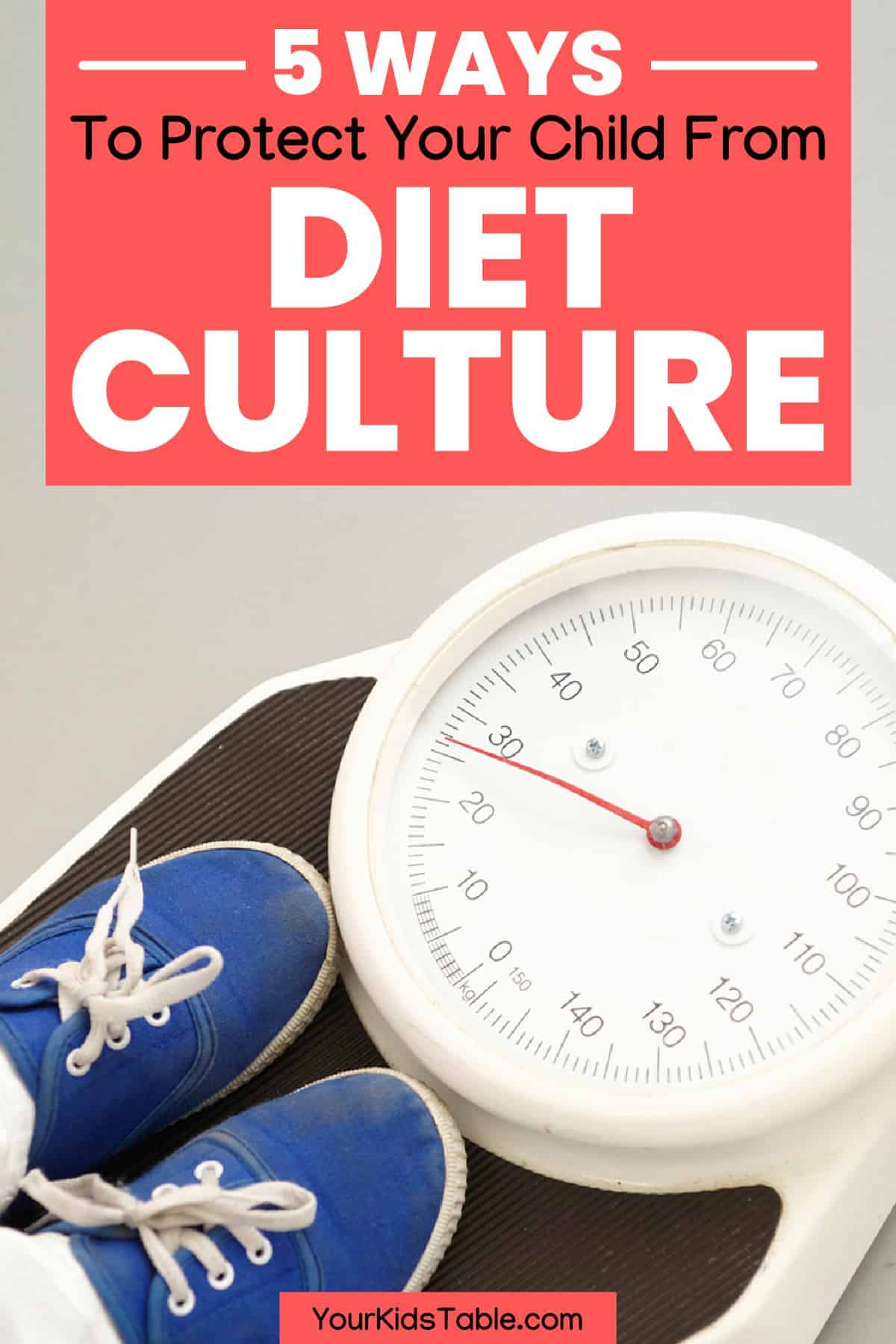Kids are bombarded with images and talk about body image, learn how to protect your child from diet culture so they can have a “healthy” body image throughout their life!
The pressure to be thinner is felt by all of us–from parents and grandparents to kids as young as three! While some parents are familiar with worries and stress about eating and weight, they might be surprised and shocked when they hear their kids vocalize those same worries, too.
In fact, many parents aren’t just shocked, they’re also at a loss when it comes to identifying exactly what causes those fears, as well as, how best to tame them.
Good news! Finding great answers to those questions isn’t as hard as you might think, according to Amelia Sherry, MPH, RD, CDN, CDCES.
Amelia is the registered dietitian/nutritionist behind NourishHer, which is dedicated to helping moms bolster their kids’ protection against dieting and dysfunctional eating, as well as, worry about their body and their weight.
Through NourishHer, Amelia combines her personal history overcoming a decades-long history with disordered eating with her professional expertise as a pediatric dietitian to provide effective and easy-to-understand tools and strategies you can use to ensure your kids are in a happy, healthy place with food.
Amelia has helped hundreds of parents overcome their child’s struggles with diabetes and prediabetes, growth, and weight changes.
As a parent herself, she believes the real secret to raising great eaters is feeling more relaxed about eating, feeding, and food ourselves.
Here, she shares her insight and recommendations for keeping your kids free from the negative pressures of diet culture.
If you’ve ever heard your child say, “I feel so fat” then you’re well aware that hearing that self-criticism about their looks can be especially heartbreaking.
But, even if your child has never expressed worry about the size and shape of their body, you may have concerns of your own. Is it okay to let them eat so much? Are they gaining too much weight? Or how do I teach them to eat healthy without making them worry or feel self-conscious about every bite?
Kids as young as three worry about being in a bigger body and girls as young as five have reported restricting food because of worry about their weight. Diet culture puts extra pressure on us to focus on, and want to change or fix, our body to meet acceptable norms. And that pressure wreaks havoc, not only on our child’s relationship with their body, but their eating habits too.
Raising kids who have healthy body images, as well as feel good about their eating, is possible so long as parents know what they’re up against and how to help kids minimize dieting pressures, or even better, ignore them.

What is Diet Culture?
In it’s simplest form, diet culture is the shared belief that thinner bodies are better bodies. Diet culture assigns higher value and virtue to smaller bodies, as well as certain foods and eating styles that are meant to help you be and stay that way.
Diet culture can be very obvious and also subtle and much less clear. Advertisements for slimming clothing or foods that help you “fight fat” are part of diet culture.
So is that vague feeling of guilt or regret that you get when you allow your child to eat a food that’s thought to cause weight gain or be unhealthy.
A well-intended compliment from grandma that says, “Oh sweetheart, you’re so lucky that you can eat that and still stay so skinny” is diet culture.
Even without parents realizing it, much of our attitudes and beliefs about food and eating revolve around the idea that we need to be and stay thin. What parents also often don’t realize is that we believe we need to do that even if it’s causing us grief, guilt, shame, and stress.
Diet culture sends the message to our kids that they need to be in thinner bodies to be valued and even loved.
And when they don’t meet those standards, or even just perceive themselves as not meeting them, they learn from a young age that dieting is a remedy to fix it.
Kids who diet, however, are at a significantly higher risk of binge eating and developing a full-blown eating disorder, a condition that can have dire consequences. With this in mind, parents often want to do everything they can to minimize the pressures of diet culture on their kids.
The good news: Upping protection against weight worry and dieting is possible! And you can start now with these strategies.
5 Strategies to Protect Your Child from Diet Culture
Strategy #1: Nix Weight Talk – Especially at the Table
When it comes to body weight, yours, your child’s, and others, avoid talking about it completely.
Research shows that when parents talk about weight, including eating to lose weight or even maintain weight, kids have more disordered eating habits (such as restrictive eating and binge eating), lower self esteem, more body dissatisfaction, and are more likely to be depressed.
This is regardless of whether that child is underweight, normal weight, or overweight.
If you’re raising a child in a larger body, weight talk might feel necessary or well-intended, yet research shows it is not. And, it probably goes without saying that avoiding talking about dieting is extremely important too, even if you’re referring to a friend or someone outside of your family, or even if you believe that your child would benefit from losing weight.
Weight loss diets are shown to be ineffective, lead to weight gain over the long term, lead to eating disorders, and can cause other serious harms in children.
If you’re searching for the right things to say at the table, talk about healthy eating or eating in ways that make us feel good, give us energy, and or support specific body parts or processes.
You can say, “Isn’t it neat that eating carrots can improve our eyesight?” or “Did you know that eating yogurt can help strengthen our bones?”
Or, “Remember that tummy ache you had last week? Well, eating oatmeal and veggies can help stop that from happening again because those foods have fiber.”
Strategy #2: Avoid Focusing on Portion Sizes
Many parents feel like they need to guide their children when it comes to how much or how little they need to eat. Tough as it is to do sometimes, research shows that kids do best when they are given the trust and freedom to make those decisions themselves.
Children are born with an innate ability to regulate their food intake based on sensations that come from within their body, specifically how hungry they are before eating and how full or satisfied they feel throughout and afterward.
As parents, it is our job to help our kids stay attuned to those physical sensations, which are caused by the interoception sense.
Thanks to pressures put on us by diet culture, we might feel that saying things like, “I think you’ve had enough,” or even “Only take one, please” is something that we should do, particularly around high fat, high calorie, or other forbidden-feeling foods.
Surprisingly, it’s just the opposite, a habit we need to avoid.
When we step in and tell our kids to stop before they are ready or feel full or satisfied, we are essentially teaching them to ignore their internal body signals and listen to us instead.
Creating this kind of distrust of the body and hunger, in particular, can have negative consequences on eating, triggering feelings of confusion, shame, and guilt for a child when it comes to food. Plus, it sets kids up to eat even more of those same foods we put a lot of limits on.
Research shows that when parents restrict certain foods, even with the best of intentions, their children are more likely to overeat or feel out of control around those foods when they are exposed to them, creating a negative dynamic that can last into adulthood.
A better approach? Checking our own need to control amounts and allowing our children to learn how to self-regulate themselves instead.
This can be really tough for some of us, especially if we perceive that our child is over (or under) eating. However, kids need the freedom to make mistakes and learn balance with food from within their bodies, not from outside rules and restrictions.
If you’re struggling to allow your child to eat as much as they want at meal and snack times, you can get extra support from Satter’s Division of Responsibility (sDOR), a feeding model pediatric nutritionists use to help parents build trust with eating particularly when it comes to encouraging self-regulation.
And, if you’re concerned about your child’s weight, talk to their pediatrician who can reassure you; in most cases, if they’re holding steady on their growth curve, then they are doing great.
Strategy #3: Keep Superheroes and Villains Out of the Kitchen
Parents can support kids in feeling good about their eating if they avoid using the same language as those who promote dieting and diet culture.
For example, referring to certain drinks, brands, specific foods, and even restaurants as “bad for you,” “junk” or “junk food,” and “unhealthy” can trigger feelings of guilt and shame, especially if you’re referring to something your child really likes or asks for often.
Additionally, labeling foods as “good for you” or “healthy” doesn’t make them taste better or more enjoyable, it simply ups the pressure or sense of obligation to eat them.
To really support your kids in feeling good about food, try developing a more neutral attitude towards food.
One way nutritionists help parents and kids do this is by acknowledging that ALL foods have value and can provide some nourishment. Sugar is a carbohydrate that provides energy, fat is essential for brain function, and even often demonized packaged snack foods like chips provide some B-vitamins and fiber.
One more reason to avoid name calling when it comes to food: Even if our kids are eating those foods, when we do this, we still inadvertently send the message to our kids that other people who enjoy them are doing something “bad” or “wrong,” a judgment that isn’t fair or true.
Strategy #4 Be Extra Clear About Values
Diet culture is based on a bias against certain body types. Protect your child from internalizing this by being very clear that body size has nothing to do with a person’s health, personal qualities, or value.
You can explain to them that in your family, you value people for their behaviors and attitudes, not the way they look.
To reinforce this, avoid the tendency to compliment or comment on appearance and draw attention to other qualities and efforts your child and other people have instead.
For example, instead of “You look so pretty,” try saying “I can tell you put a lot of effort into getting ready today.” You can also say things like, “I love the way you stayed focused on your homework even though we were making a lot of noise,” or you are “So kind to share your toys” or “So brave to make a new friend.”
Additionally, if you hear your child call someone fat, you can use it as an opportunity to say, “Fat is a part of our body, just like bones and muscle. People are not fat, they have fat.”
And teach your children that it’s not polite to comment on other people’s bodies. And if you’re raising a larger child, parents can also be extra vigilant about not tolerating weight-based teasing say from siblings or other family members.
Weight-based teasing has been shown to be especially detrimental to kids’ relationships with food and triggers future disordered eating habits such as extreme restriction and binging.

Strategy #5 Get Ready For It
Whether at puberty or earlier, there’s a good chance that at some point, every child will express concern about their body shape or size regardless of their size, shape, or weight. Girls aren’t the only ones who worry. An increasing number of boys, for example, worry they’re not muscular enough.
While our first instinct might be to reassure our kids that they “look great,” or “aren’t fat,” it’s important to avoid minimizing their concern and go further into the conversation.
Instead of telling your child that they don’t need to worry about it, have an age-appropriate discussion about diet culture itself and the reasons that focusing too much on our weight or shape can be harmful. You can emphasize the importance of accepting our body for what it can do, not what it looks like.
To prevent their concern from going further, get curious. Ask them what’s making them say this, feel this way, or compare themselves to others. Is it a program they’ve been watching, a conversation at school, a comment from a friend or family member, or a sport activity they’ve been participating in such as dance or swim?
It might be hard for a child to discern, but if you can be patient and listen, you will likely get a clue into the trigger that’s stirring up those feelings, and that’ll make it easier to help them deal with their concerns and feelings.
The more information and understanding you have about your child’s thoughts and beliefs about body, food, and eating, the better you’ll be able to address their feelings in a positive and productive way.
6 Simple Strategies for Protecting Kids From Diet Culture (FREE mini audio workshop)
If you’d like to learn more ways to feel less stressed and more confident about how you talk to your kids about food and eating, then grab this mini 30-minute workshop. You’ll learn to help you and your daughter (all your kids, actually!) feel at peace with food, body, and weight.
*Click to Get Access to 6 Simple Strategies for Protecting Your Daughter From Diet Culture
Amelia Sherry, MPH, RD, is a HAES-aligned nutrition therapist based in New York and the founder of NourishHer where she hosts free and paid workshops and programs for mothers who are dedicated to protecting their daughters from stress and worry about eating and weight. She sends out One Nourishing Idea weekly and is on Instagram @AmeliaSherryRD
